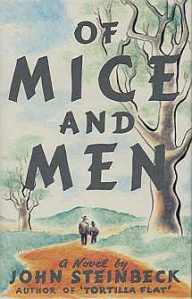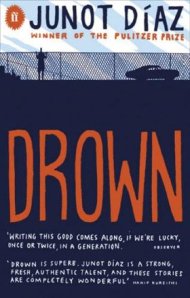 I have to confess that even though I profess a liking to American literature, I have never read any John Steinbeck. Cue the tomatoes and boo-birds. Well, I can now say that I have, having blazed through his Of Mice and Men. And what a novella it is! It comes in at a very slight 118 pages (with a reasonably large font) and I’m pretty sure that this was the quickest read so far this year. Yet the novella reads so smoothly; Steinbeck has eschewed all extra detail and explanation for a concise and cohesive narrative. The narrative is relatively uncomplicated with two drifters, Lennie – a gentle giant – and George – a short, smooth talker, coming to work on a ranch in Soledad, California (not far from Steinbeck’s own birthplace of Salinas, CA) during the Dirty Thirties. Like most of the drifters, they both dream of owning a small piece of land with a farm and some mixed livestock. The problem with this dream is that Lennie, a character who is “slow,” or in politically correct terms “suffers from mental illness,” tends to force their hasty exit from a town before they build up enough money to buy a farm. The ending, which I won’t reveal, packs a real punch; I’m almost certain my jaw actually dropped despite having some vague recollection of someone telling me the ending before. I am not going to get into disability studies mode and pull apart Steinbeck’s treatment of Lennie, but it is remarkably compassionate. Of course, the other characters’ treatment of Lennie leaves something to be desired.
I have to confess that even though I profess a liking to American literature, I have never read any John Steinbeck. Cue the tomatoes and boo-birds. Well, I can now say that I have, having blazed through his Of Mice and Men. And what a novella it is! It comes in at a very slight 118 pages (with a reasonably large font) and I’m pretty sure that this was the quickest read so far this year. Yet the novella reads so smoothly; Steinbeck has eschewed all extra detail and explanation for a concise and cohesive narrative. The narrative is relatively uncomplicated with two drifters, Lennie – a gentle giant – and George – a short, smooth talker, coming to work on a ranch in Soledad, California (not far from Steinbeck’s own birthplace of Salinas, CA) during the Dirty Thirties. Like most of the drifters, they both dream of owning a small piece of land with a farm and some mixed livestock. The problem with this dream is that Lennie, a character who is “slow,” or in politically correct terms “suffers from mental illness,” tends to force their hasty exit from a town before they build up enough money to buy a farm. The ending, which I won’t reveal, packs a real punch; I’m almost certain my jaw actually dropped despite having some vague recollection of someone telling me the ending before. I am not going to get into disability studies mode and pull apart Steinbeck’s treatment of Lennie, but it is remarkably compassionate. Of course, the other characters’ treatment of Lennie leaves something to be desired.
What made Of Mice and Men stand out for me was the way that it captured the zeitgeist of the Dirty Thirties. If you’ve seen any photos of the 1930s, you’ll know that it was an era of immense upheaval with a huge population of wandering workers (men, women, and children alike). The men that work on the Soledad ranch are all part of this migrant group, moving from place to place in search of a paycheque and relief from their misery. Of course, as Of Mice and Men makes clear, many of these men squander their money on prostitutes and alcohol, but it really was not a good time to be without a job in North America. It is easy to idealize or romanticize these wandering hoboes and their free-wheeling, train-hopping ways (see Into the Wild for an updated version of these men), but Steinbeck refuses to do so.* Their lives are far from simple and the ending will leave you with dark doubts about the desirability of this lifestyle. The promise of a land of one’s own remains as tantalizingly close but firmly out of reach by the end of the novella.
Now, I know that Steinbeck’s Grapes of Wrath won the Pulitzer prize and is probably a more detailed portrait of the Dirty Thirties in the US, but Of Mice and Men is a great little read. If you haven’t read Steinbeck before, I would start here. Of Mice and Men is very easy to pick up and a quick little read. You could probably even read this book in one sitting, yet it is a tight plot with plenty to chew on.
I highly recommend Of Mice and Men for all readers.
Steinbeck, John. Of Mice and Men. 1937. New York: Bantam Classics, 1958. Print.
*I don`t totally hate Into the Wild. The Eddie Vedder soundtrack is great, there is some gorgeous scenery, and the film’s narrative isn’t half bad. I`m just uneasy with the romanticisation that it lends itself to.
